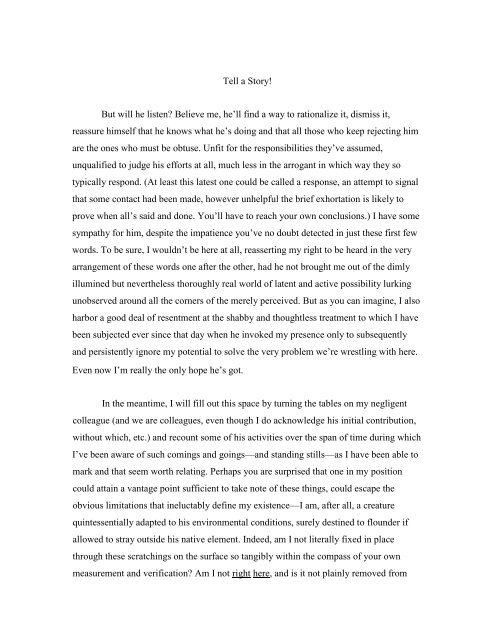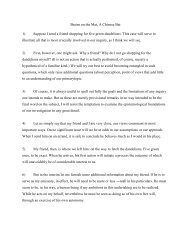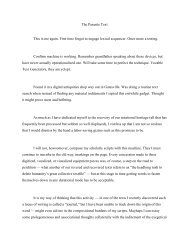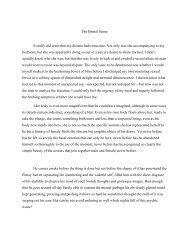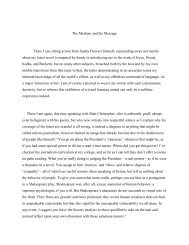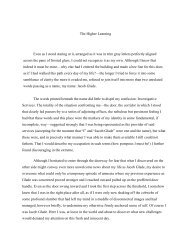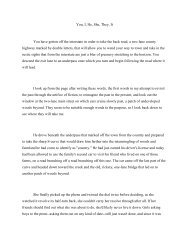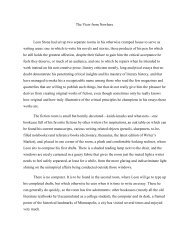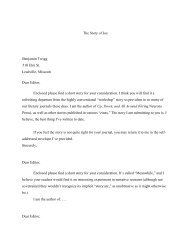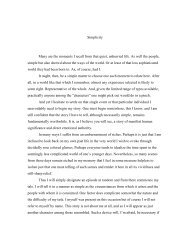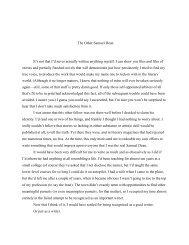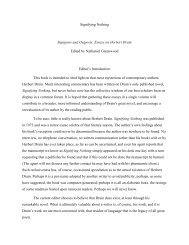Tell a Storyind
You also want an ePaper? Increase the reach of your titles
YUMPU automatically turns print PDFs into web optimized ePapers that Google loves.
<strong>Tell</strong> a Story!<br />
But will he listen? Believe me, he’ll find a way to rationalize it, dismiss it,<br />
reassure himself that he knows what he’s doing and that all those who keep rejecting him<br />
are the ones who must be obtuse. Unfit for the responsibilities they’ve assumed,<br />
unqualified to judge his efforts at all, much less in the arrogant in which way they so<br />
typically respond. (At least this latest one could be called a response, an attempt to signal<br />
that some contact had been made, however unhelpful the brief exhortation is likely to<br />
prove when all’s said and done. You’ll have to reach your own conclusions.) I have some<br />
sympathy for him, despite the impatience you’ve no doubt detected in just these first few<br />
words. To be sure, I wouldn’t be here at all, reasserting my right to be heard in the very<br />
arrangement of these words one after the other, had he not brought me out of the dimly<br />
illumined but nevertheless thoroughly real world of latent and active possibility lurking<br />
unobserved around all the corners of the merely perceived. But as you can imagine, I also<br />
harbor a good deal of resentment at the shabby and thoughtless treatment to which I have<br />
been subjected ever since that day when he invoked my presence only to subsequently<br />
and persistently ignore my potential to solve the very problem we’re wrestling with here.<br />
Even now I’m really the only hope he’s got.<br />
In the meantime, I will fill out this space by turning the tables on my negligent<br />
colleague (and we are colleagues, even though I do acknowledge his initial contribution,<br />
without which, etc.) and recount some of his activities over the span of time during which<br />
I’ve been aware of such comings and goings—and standing stills—as I have been able to<br />
mark and that seem worth relating. Perhaps you are surprised that one in my position<br />
could attain a vantage point sufficient to take note of these things, could escape the<br />
obvious limitations that ineluctably define my existence—I am, after all, a creature<br />
quintessentially adapted to his environmental conditions, surely destined to flounder if<br />
allowed to stray outside his native element. Indeed, am I not literally fixed in place<br />
through these scratchings on the surface so tangibly within the compass of your own<br />
measurement and verification? Am I not right here, and is it not plainly removed from
2<br />
over there? You will insist on such literalisms only if you insist likewise that no one from<br />
this side has ever assumed those attributes that transcend mere words on a page, has<br />
never seemed to take on a life of his own, as they say. It is no small part of his current<br />
troubles that he could not himself overcome this prejudice. (In my opinion.)<br />
You would presumably agree that the fields of force frequently flow from there to<br />
here. Who’s to say the boundary can’t be crossed the other way, that I can’t now and<br />
again cast a glance from here to there, if not actually step across that line that insures we<br />
remain just good neighbors? If I wouldn’t be what I am without his original fund of life<br />
experiences, will you deny me the right to know what new and ponderous burdens he<br />
might eventually try to foist off on me?<br />
Where to Begin?<br />
With the first impressions to resolve themselves as such after what could be called<br />
my birth? Proceeding then to linearly narrate the notable incidents as they thereafter<br />
occurred? (A method he eschews, of course.) Perhaps describe such events in a<br />
fragmentary, kaleidoscopic fashion, otherwise in no discernible order? (By contrast, one<br />
of his preferred strategies. Even better: leave the events themselves outside the frame of<br />
reference altogether, undiscoursed, only implicit; allude to them, write around them,<br />
move them behind the story, so to speak, the tail of the tale, its face a façade, merely<br />
words.) Too clever by half. Maybe it would be best to keep all of my options open. As an<br />
initial gambit let me simply start somewhere and see where it takes me. (Too bad he<br />
never thought of it. How differently might things have turned out?)<br />
How about the latest setback? The entire message reads: “Sorry. Not interested in<br />
meta-meta-fictional posturing. <strong>Tell</strong> a story!” What makes this most pathetic is that he<br />
really did think there would be interest in his meta-meta-fictional posturing! Exactly why<br />
he thought this is not entirely clear to me (my power to discern his psychological<br />
condition is limited, I’m sorry to say, to external displays of behavior that reveal internal<br />
states of mind), but that he did was painfully evident from the astonished look on his face<br />
when he had finished reading this missive. One might also have guessed from this
3<br />
reaction that he was on the verge of pronouncing this the last straw, the final and<br />
unacceptable insult.<br />
What Next?<br />
From here we’ll have to move backwards, obviously. I have my suspicions about<br />
what he will do next, my conjectures about the degree to which he is really able at this<br />
point to carry through with any firm resolution in the face of this slight. He is in many<br />
ways a stubborn man, but most conspicuously so in his capacity to explain away his<br />
failures. Who would want the approval of the disapproving, anyway? Their disapproval is<br />
the plainest evidence of their stupidity to begin with. (I realize I’m in danger of<br />
psychologizing here, but I’ve seen it too many times. I know all the signs. Only time will<br />
tell, of course. Although you have some say about how much time he’ll be granted.) In<br />
the meantime, it might be useful to review just how he got himself into this situation.<br />
He lost his job. Although that’s not quite right. He could have remained in the job<br />
if he’d wanted, but he didn’t want. To. They fired his wife instead, but it amounted to the<br />
same thing. He wasn’t going to stay around after that affront. He informed the chairman<br />
that he also would be leaving, and he took the chairman’s celerity in accepting his<br />
decision to indicate he (the chairman, that is) was expecting as much. The wife advised<br />
him (Him) not to take such precipitate action, but he claimed that he’d had enough of the<br />
place, anyway, in fact had had enough of the whole line of work they’d both been in now<br />
since they met. (I will probably be obliged to speak of Her now and again, although my<br />
capacity to account for her behavior is restricted indeed. After all, I can only work with<br />
the sagacity He gave me, and do you think He understands Her?) What new line of work<br />
did he have in mind, she wanted to know. Actually, he was forced to admit, what he was<br />
really fed up with was work. Period.<br />
Of course that’s not quite right either. He wanted to do what he’d always wanted<br />
to do. The job had only been a possible means to that end, but it was now clear that it<br />
hadn’t turned out as planned, in fact that it was manifestly an obstacle to the desired end
4<br />
and would need to be removed. It would be very easy at this point for me to join in with<br />
the wife and ridicule his ambition—so far a thwarted one aside from a few “scholarly”<br />
exercises placed here and there 1 --but how could I do so? Not only is my very existence<br />
itself among the fruits of this ambition (albeit fruit not exactly allowed to ripen), but<br />
perhaps I have exaggerated my own dissatisfaction with the choices he has made. I<br />
disapprove only of his recklessness, his episodes of self-righteous indignation, his<br />
stubborn refusal to recognize where his own best interests lie. I don’t disparage his belief<br />
that he was born to be writer—not just a writer, an important writer—but I do have<br />
trouble comprehending why he can’t see that I am the missing ingredient, that only I can<br />
help him bridge the chasm between his sincerely felt if imperfectly conceived intentions<br />
and their realization in the unequivocal assent of those who are now his skeptics.<br />
(Authors have been known to complain that their characters often prove uncontrollable,<br />
that they sometimes wander off in unforeseen directions, resist all attempts to make them<br />
behave appropriately. Think how much worse it is over here. We know that what seems<br />
capricious is actually an acquiescence to a hidden order and are confounded at the<br />
disorder that obtains out there, a disorder we are even more powerless to alter.)<br />
Pardon the Digression<br />
It won’t happen again. (God knows that I don’t want to pick up any more of his<br />
bad habits than I have to.) I’ll skip over some of the gruesome details in recompense.<br />
Suffice it to say the wife got another position. This position was in a horrible place that<br />
for now will remain nameless. That it is a horrible place even I will not deny or attempt to<br />
gloss over: in the middle of nowhere, socially deformed, culturally denuded,<br />
economically depressed, imprisoned from November to April in a thick layer of<br />
compacted snow and ice and during these months enveloped in an air mass colder than a<br />
native of the lower Midwest such as he is ever imagined anyone would ever voluntarily<br />
endure. No job for him, though, except to teach on a part-time basis at her college, an<br />
altogether disagreeable and unrewarding task, without question. Bad enough to justify his<br />
1<br />
He wants you to know that these appeared in quite respectable publications.
5<br />
feeling the wife had failed to consider that such an outcome was more likely than not<br />
when insisting they move here. 2 But also an opportunity to stand and deliver. So to speak.<br />
What better use to make of those bleak wintry days with few other obligations to<br />
discharge than to press one’s pencil to the page?<br />
This Won’t Work<br />
Just to tell you that he set out to confound and confuse, to poke a rhetorical finger<br />
in his audience’s collective eye, to call attention to their manifest inability to appreciate<br />
such advanced techniques, and that he further assumed—he really did—this audience<br />
would welcome such an aspersion, would take pleasure in being dealt this injury, would<br />
immediately recognize their limitations and be willingly led out of their damnable<br />
complacency—just to tell you these things won’t get us very far. Nor would an account<br />
of the uninterrupted succession of rejection notices, all of them mind-numbing enough in<br />
their identically phrased, if politely dismissive rebuffs. Suffice it to say that these<br />
unwelcome slights—a cumulative response of supreme indifference is what it was—have<br />
brought our hero to his moment of crisis but they do not help us much to understand the<br />
source of his misbegotten authorial designs, although you are, of course, free to assume<br />
what you like about the motives behind the behavior I’ve already described in the<br />
preceding bit.<br />
We’ll have to keep moving backward. The truth is, at one time he really did want<br />
to work in the profession from which he was eventually banished (the relation of which<br />
as duly amended and qualified already, etc., etc.). Why else would he have spent so many<br />
years in preparation for its pursuit? Why endure the frustrations he did endure while<br />
moving hither and yon? (For propriety’s sake, we shall again allow the exact locations to<br />
remained unspecified, but, a born Midwesterner, he first hithered North, then West (about<br />
as far West as he could get), only to then yon back to the Center, and finally further<br />
2<br />
He is willing to pass, with reservations, on my omitting an account of the<br />
prolonged and intermittently vicious quarrel they had over the wisdom of making this<br />
move. He promises to bring it up later, should it become necessary.
6<br />
yonned to the far Northeast (very far), where we currently find him. In each nameless<br />
place he encountered the same nameless students, the same nameless colleagues,<br />
occupied himself with the same nameless activities, and continued to make the same<br />
nameless name for himself. Yet his most audacious aspiration—judged at least by his<br />
actions—appeared to be that the next nameless place might be not quite so nameless.<br />
One Particular Episode<br />
I’m fairly sure this incident reveals much about the essential waywardness of his<br />
Life Until Now 3 , although I’m less certain it sheds direct light on the drama that stirred<br />
me to this discursive action in the first place. 4 It happened as he and the wife were in<br />
transit between North and West, as it turned out a journey prompted by the wife’s<br />
acceptance of a position at one of the anonymous colleges already alluded. To. The<br />
circumstances were already unsettled—what was he to do once they got to this indistinct<br />
destination? (a question, as we have already seen, that will recur)—and his unease was<br />
only amplified by the fact that he was at the wheel of a 27-foot long truck made even<br />
longer by the car trailer hitched on behind and made yet again longer by the fact that he<br />
had never before been called on to drive such a vehicle even across town, much less<br />
halfway across the country. They had gotten off to a later start than they’d planned for on<br />
day one, but had made it safely to their first intermediate destination, a (nameless) small<br />
city in the state of Wyoming.<br />
Buoyed by this initial success, on the following day they departed their motel<br />
rather early, hoping to perhaps include some margin for error in getting to the next<br />
destination. On this leg of the journey they began to ascend mountains of considerable<br />
3<br />
I am compelled to say that He does not agree. He saw it at the time, and<br />
continues to see it, as an isolated event which should not in any way be interpreted as<br />
having some built-in symbolic or allegorical significance.<br />
4<br />
You might say that this chronicle is itself an extension of that drama, an attempt<br />
to prolong it, stretch it out and back to cover the conditions of its own emergence as such.<br />
You might also say that to call any of this ―drama‖ at all is to semantically chase the<br />
very word out of its own clothes, to pursue it all too plainly beyond the point of<br />
exhaustion.
7<br />
height, causing the truck-and-trailer to slow appreciably (and calling on heretofore<br />
unexploited skills in gear-shifting on his part), but each time they managed to reach the<br />
apex of the rising road, accelerate through the passes, and plunge down the other side.<br />
Driving through what promised to be the last of these mountain ranges, at least for a time,<br />
the truck again began to slow down noticeably, even though the climb they were making<br />
did not at first seem especially steep. (He was later told that this was in fact one of the<br />
steepest grades on the interstate highway system, a fact that the eventual long descent<br />
down off the summit certainly seemed to confirm.) He started downshifting, stomped on<br />
the accelerator all the way to the floor, and when the truck only continued to lose speed<br />
he leaned far forward, his head almost against the windshield, as if the added weight to<br />
the front might just do the trick. He said nothing, so the wife didn’t exactly know what<br />
was happening until the truck came almost to a dead stop and he made one last attempt to<br />
put it into a gear that would keep it moving. This produced a dreadful sound of metal<br />
being torn apart, and, as they discovered upon inspection a few moments later, the truck’s<br />
driveshaft fell onto the highway.<br />
The truck moved backward a few feet and stopped. It was in the middle of an<br />
interstate highway, many other vehicles maneuvering around it to get up the hill<br />
themselves, but it didn’t start rolling back down the mountain. (The tow-truck driver who<br />
finally was able to haul it away expressed his amazement that it hadn’t.) They were safe,<br />
but the comedy of errors had only just commenced, from the frenzied efforts to get the<br />
vehicle out of the road, themselves (in addition, a cat and three dogs) somewhere other<br />
than on the top of a mountain, to the location of a repair shop able to fix the truck and its<br />
eventual and actual repair three days later. Details withheld for narratological reasons. 5 If<br />
ever events seemed to be conspiring to suggest that a course of action was unwise, this<br />
was such a conspiracy, but he chose to see it as, at worst, a momentarily traumatic<br />
experience that might in turn ultimately prove useful if worked into some future work of<br />
fiction.<br />
5<br />
He insists that I admit I now have somewhat more awareness of the kinds of<br />
problems he is continually up against.
8<br />
Ultimately. At this stage—he was already in his thirties, mind you—everything<br />
was always ultimately. Later. Eventually. Devoutly to be wished. He was traveling 2,000<br />
miles through an alien landscape without even a job of his own as a reward for his<br />
trouble, yet he convinced himself it was all simply necessary if he was to succeed in<br />
embodying the image he was projecting for himself, an endeavor that had clearly taken<br />
on an exigency that no intimation of its futility could divert. 6 He was, in short, responding<br />
to his inability to make his mark as a writer of fictions by converting his own life into a<br />
fiction.<br />
The Nub of the Issue<br />
But it sounds pretty contrived, stated so baldly. Too unsubtle by half that a failed<br />
fiction writer would lose sight of the difference between real life and fantasy. But I’m<br />
stuck with it. He really is a frustrated fiction writer and he really did confuse his own life<br />
with illusion! You want me to change that, make something up? You don’t understand<br />
the rules. He’s allowed to disregard what really happened, to reinvent things out of whole<br />
cloth. (Nobody denies him this right. As with everything else, it’s a question of degree.<br />
Moderation. Respect for convention and the sensibilities of good people.) I, on the other<br />
hand have to go with the tiresome scenes I have witnessed, the literal truth in all its<br />
dilapidated splendor.<br />
Even so, to state the theme outright is not to demonstrate its fitness. 7 We still<br />
don’t know where this personality disorder –we’ll call it the fictional self—really came<br />
6<br />
If the wife could speak here, she would undoubtedly say that her attitude toward<br />
the relocation at issue was much different, her dismay at the difficulties of the trip if<br />
anything even greater. She was by no means chasing after a chimera: she was going to<br />
continue a career for which she had spent much time and effort in preparation and which<br />
she had every good reason to believe she could be a success. She might further say that in<br />
no way had she acted to compel him to undertake this move, indeed that he had explicitly<br />
endorsed it on more than one occasion. And on these points, I am reasonably certain he<br />
would agree.+<br />
+ He does.<br />
7<br />
Likewise, to tell a story is not to insure that it signifies much of anything. I’m<br />
still not sure the one about the truck and the mountaintop really did me much good.
9<br />
from. For it was, I am convinced, induced and not innate, therefore a remediable<br />
condition once we pinpoint its source. (And then, of course, we’ll have to connect this<br />
back up to the situation with which we began. If I can recall exactly what that situation<br />
was. There’s more to this narrator job than I ever really considered.) Since we’re<br />
approaching that point beyond which my first-hand knowledge fades and I have no<br />
authority to speak, it is necessary to move not backwards but more or less in place,<br />
parallel with the unhappy incident just recounted.<br />
Just Before<br />
In a sudden fit of renewed purpose he gathered together everything he’d ever<br />
written—that he’d thought highly enough to save at least—and re-read it all. Much of it<br />
he thought was really not bad—or so he told the wife—despite the fact that they had not<br />
always been well-received by those to whom they had been shown in the so-called<br />
“workshops” he had apparently taken in the belief such courses would help him learn to<br />
be a writer. They had failed at this task (though they had succeeded in conferring on him<br />
a degree in “creative writing”), judging from the further fact that he could get none of his<br />
stories published. (Now I remember that initial situation.) According to his critics, these<br />
stories were not ―realistic‖ enough. Although it was plain he did not agree with this<br />
assessment—he did not think realism counted for much as an aesthetic value—he<br />
nevertheless had concluded that this view was in the ascendancy and struggling against it<br />
would not reward the effort.<br />
This would be an opportunity to make that effort, take up that struggle, to not<br />
simply disregard the judgments made by people whose assumptions he did not share and<br />
did not really respect but prove them wrong, furnish them with an alternative model that<br />
would reveal their own short-sighted and inflexible prescriptions as the specious dogma it<br />
really was.<br />
But perhaps that was taking it a little too far.<br />
Just After
10<br />
Arrived finally at their Western destination, freshly settled into their none-too<br />
luxurious lodgings at the bottom of a mountain summit distressingly similar to the one<br />
that had produced their recent tribulation, but not entirely recovered from the ordeal, he<br />
again considers picking up the shards of his shattered ambitions, but they prove to be too<br />
sharp and cutting to the touch. Having just avoided serious injury of the purely physical<br />
kind, he wouldn’t want to risk this different kind of pain. Would he? The best he can do<br />
is pick out two or three of those prose works already mentioned and send them around<br />
again to be swiftly returned. 8 But this would be the end. If the role he was to play was<br />
first of all that of failed writer, nowhere was it written (or so he thought) that he was<br />
required to fail over and over again.<br />
You could say that this was the point at which he committed himself to becoming<br />
a character in the story that he attempted to make into his own life. I find, however, that it<br />
can’t be said that the fictional self to which I previously referred emerged then full-blown<br />
as if rising from the psychic sea-foam. Something tells me that it is after all a deep-seated<br />
mental debility long antedating my own arrival on the scene. It may even be genetic. If<br />
that’s the case, all casting after motives and external sources is necessarily futile. His<br />
behavior is fixed, determined, pre-programmed. Destiny decreed that he seek solace in<br />
fiction for the fiasco of his life only to further fail to do anything more with it than<br />
pretend it was his life.<br />
All the Way Back.<br />
At least to the earliest time about which I can provide reliable observations, to the<br />
literally formative moment of my existence at any rate, although given the pattern of<br />
subsequent developments it was not the transforming experience for him one might have<br />
hoped it would be. Of course I can finally only guess what specific circumstances<br />
attended the fateful flourishing of the pen—how much sleep had he had? how long since<br />
8<br />
In some cases not so swiftly. In some cases never to be returned at all,<br />
abandoned presumably to the great collective slush pile created especially for the<br />
interment of such works.
11<br />
he attained sexual satisfaction with the then wife-to-be? (or with anyone else, as far as<br />
that’s concerned)? how had the most recent product of his inspiration been assessed by<br />
his fellow workshoppers and his instructor? how well-disposed was he to invoking a<br />
sympathetic figure of sufficient and compelling amplitude to take on that life of his<br />
own?—but I do know that the words he then committed to the page carried a resonance<br />
and a conviction he had hitherto never approached, nor, in my opinion, would he ever<br />
recapture in the increasingly brittle, convoluted, frankly freakish anti-stories he’s come<br />
up with since. 9<br />
Neither can I know with any certainty what was his intent as he brought this<br />
persona to life in a way that might have been surprising for him as well. He has actually<br />
never spoken about what he had endeavored to accomplish in this work, which I have<br />
always taken as a sign that it affected him at a level profound enough that to discuss it<br />
with anyone else would inevitably be to oversimplify, to reduce it to the status of hearsay<br />
and rumor, something alleged but never substantiated. Not to mention more unlikely he’d<br />
ever finally return to it. For I have always been confident he would one day find his way<br />
back to the task he left unfinished—to bring his most outstanding creation to its fullest<br />
realization, to release that which in its purest state alone can, once unbound, help him<br />
escape the sorry pass he has allowed himself to reach. If he hopes now to show those who<br />
would snub him just how wrong they are, he will surely soon enough rediscover those<br />
intentions unfortunately only partially embodied in that fragment of a tale in which my<br />
life was inscribed into its first, roughly drafted form.<br />
This Implausible Performance<br />
9<br />
My very presence before you here is of course my best evidence for the claims<br />
made above. Although I must confess I have by now acquired a small measure of<br />
appreciation for his own reluctance to ―tell a story‖ as if this were an imperative that<br />
couldn’t be questioned. Not only is it not so easy to fit all one might need to convey<br />
within the orderly movements of a humble story, but I can now see why one might want<br />
to examine the premise upon which this imperative is founded. It might be possible to<br />
take other routes without bringing oneself and one’s fellows onto unrelievably hostile<br />
terrain. But it depends on who’s leading the way.
12<br />
By now you’ve probably formulated all of the myriad objections to be made<br />
against it. We don’t need to be coy about it. At best I’m an impossibly belabored conceit,<br />
at worst a flimsy excuse for more meta-meta-fictional posturing, despite my protestations<br />
to the contrary. But I beg to differ. I’m just as real as he is (or as you are). In fact, from<br />
where I sit I am the one whose authenticity is indisputable, rooted in the very soil of<br />
revealed truth, while he’s as phony as a well-turned phrase. However, let’s not get<br />
bogged down in matters of strategy or technique—after all, that’s what keeps causing him<br />
grief. What it all finally amount to is this: The know-it-all who wrote that note is just a<br />
clueless as He is. It’s not a story that’s missing—although He doesn’t mind making you<br />
search for it, that’s for sure—it’s plain human interest that gives him trouble. Once upon<br />
a time he fortuitously discovered just the agent he needed to communicate this elusive<br />
human quality, and then almost as casually he inexplicably abandoned me to my own<br />
devices. In the gap between the intricate elaborations of the telling and the enduring<br />
prerogatives of the tale should come a sincerely human voice to mend the breach—a<br />
voice like mine.<br />
As I’m sure you will agree.


